As featured in the book Chinese Graphic Design in the Twentieth Century by Scott Minick and Jiao Ping
About half of this 160-page book is devoted to the 1920s and 30s, when the ideas of writer and artist Lu Xun were very influential, particularly on the young design professionals involved with the May Fourth Movement. My favorite factoid in the book: Lu Xun—who introduced modern woodblock techniques to China—loved the German Expressionists and Käthe Kollwitz in particular. The authors point out that though Lu Xun taught many Western techniques, he always encouraged designers to seek inspiration in Chinese design history.
![]() China Sketch, December 1936
"The End of Science" (back cover)
Illustrator: Zhong-xin
China Sketch, December 1936
"The End of Science" (back cover)
Illustrator: Zhong-xin
![]() China Sketch, December 1936
Designer: Tian Wu-zai
China Sketch, December 1936
Designer: Tian Wu-zai
![]() Ten Years of the Shenshi Telegraphic Dispatch Agency, c. 1930
Designer: Qian Jun-tao
Ten Years of the Shenshi Telegraphic Dispatch Agency, c. 1930
Designer: Qian Jun-tao
![]() The Short Story Magazine, August 1927.
Designer: Chen Zhi-fo
The Short Story Magazine, August 1927.
Designer: Chen Zhi-fo
![]() The Big Black Wolf, 1930
Designer: Qian Jun-tao
The Big Black Wolf, 1930
Designer: Qian Jun-tao
![]() A Great Love, 1930
Designer: Qian Jun-tao
A Great Love, 1930
Designer: Qian Jun-tao
![]() Modern Student, June 1931
Designer: Chen Zhi-fo
Modern Student, June 1931
Designer: Chen Zhi-fo
![]() Book cover, 1936
Designer: Zheng Ren-ze
Book cover, 1936
Designer: Zheng Ren-ze
![]() Children's Music, c. 1930
Designer: Qian Jun-tao
Children's Music, c. 1930
Designer: Qian Jun-tao
![]() Art Deco-style ad, c. 1930s
Art Deco-style ad, c. 1930s
![]() Creation Monthly, 1928
Creation Monthly, 1928
![]() Ahead of the Times, January 1931
Designer: Qian Jun-tao
Ahead of the Times, January 1931
Designer: Qian Jun-tao
![]() Science and Engineering Magazine, 1935
Designer: Hong Qing
Science and Engineering Magazine, 1935
Designer: Hong Qing
![]() Military Magazine, April 1937
Military Magazine, April 1937
![]() China Sketch, April 1936
"Madame Sanger in China" (Sanger was an American proponent of birth control)
Illustrator: Zhu Jin-lou
China Sketch, April 1936
"Madame Sanger in China" (Sanger was an American proponent of birth control)
Illustrator: Zhu Jin-lou
![]() The Dividing Line in Love, 1929.
Designer: Qian Jun-tao
The Dividing Line in Love, 1929.
Designer: Qian Jun-tao
![]() The Ladies' Journal, October 1931
Designer: Zhang Ling-tao
The Ladies' Journal, October 1931
Designer: Zhang Ling-tao
![]() Wandering, August 1929
Designer: Tao Yuan-qing
Wandering, August 1929
Designer: Tao Yuan-qing
![]() Literature, October 1933
Designer: Chen Zhi-fo
Literature, October 1933
Designer: Chen Zhi-fo
![]() Literature Weekly, undated issue on Russian short stories
Designer: Qian Jun-tao
Literature Weekly, undated issue on Russian short stories
Designer: Qian Jun-tao
![]() The Ark, February 1935
The Ark, February 1935
![]() Modern Woman, 1933
Designer: Qian Jun-tao
Modern Woman, 1933
Designer: Qian Jun-tao
![]() Shanghai Private Kaiming Correspondence School,
Members' Club Quarterly, c. 1930
Designer: Qian Jun-tao
Shanghai Private Kaiming Correspondence School,
Members' Club Quarterly, c. 1930
Designer: Qian Jun-tao
![]() The Muddy Stream, 1931
Designer: Qian Jun-tao
The Muddy Stream, 1931
Designer: Qian Jun-tao
![]() New literature advertisement, c. 1937
Designer: Zhang Xue-fu
For a few more political works see the complementary post on A Journey Round My Skull: Santa Claus delivers a new child into a world of violence and death
Publisher's description:From posters and advertisements to book covers and magazines, this book presents a dazzling panoply of modern graphic design in China.
Beginning with the basic traditions of Chinese graphics, the authors show how the writer and artist Lu Xun became the center of cultural revival in the new China. We see Art Deco coming to China in the Shanghai Style, and the birth of a dynamic national design style, born of Russian Constructivism and China’s own drive for new technology. The Socialist Realist art of Mao in turn adopted folk art traditions to fuel the Revolutionary machine, while the continuing search for a new identity can be seen in the graphic images of protest from the summer of 1989. 150 color and 135 black-and-white photographs and illustrations.
Chinese Graphic Design in the Twentieth Century makes a nice companion to the Steven Heller's Art Deco Graphic Design series for Chronicle (though it's published by Thames & Hudson).
Previously: Extraordinary early twentieth century book and magazine covers from Japan
Tweet this
New literature advertisement, c. 1937
Designer: Zhang Xue-fu
For a few more political works see the complementary post on A Journey Round My Skull: Santa Claus delivers a new child into a world of violence and death
Publisher's description:From posters and advertisements to book covers and magazines, this book presents a dazzling panoply of modern graphic design in China.
Beginning with the basic traditions of Chinese graphics, the authors show how the writer and artist Lu Xun became the center of cultural revival in the new China. We see Art Deco coming to China in the Shanghai Style, and the birth of a dynamic national design style, born of Russian Constructivism and China’s own drive for new technology. The Socialist Realist art of Mao in turn adopted folk art traditions to fuel the Revolutionary machine, while the continuing search for a new identity can be seen in the graphic images of protest from the summer of 1989. 150 color and 135 black-and-white photographs and illustrations.
Chinese Graphic Design in the Twentieth Century makes a nice companion to the Steven Heller's Art Deco Graphic Design series for Chronicle (though it's published by Thames & Hudson).
Previously: Extraordinary early twentieth century book and magazine covers from Japan
Tweet this
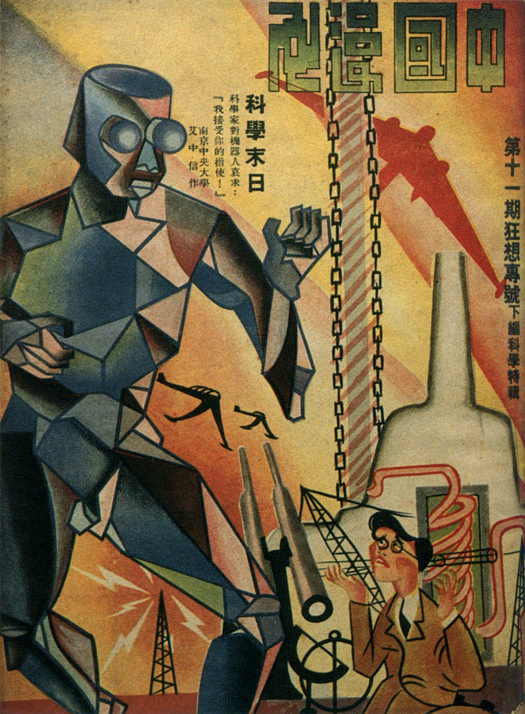 China Sketch, December 1936
"The End of Science" (back cover)
Illustrator: Zhong-xin
China Sketch, December 1936
"The End of Science" (back cover)
Illustrator: Zhong-xin
 China Sketch, December 1936
Designer: Tian Wu-zai
China Sketch, December 1936
Designer: Tian Wu-zai
 Ten Years of the Shenshi Telegraphic Dispatch Agency, c. 1930
Designer: Qian Jun-tao
Ten Years of the Shenshi Telegraphic Dispatch Agency, c. 1930
Designer: Qian Jun-tao
 The Short Story Magazine, August 1927.
Designer: Chen Zhi-fo
The Short Story Magazine, August 1927.
Designer: Chen Zhi-fo
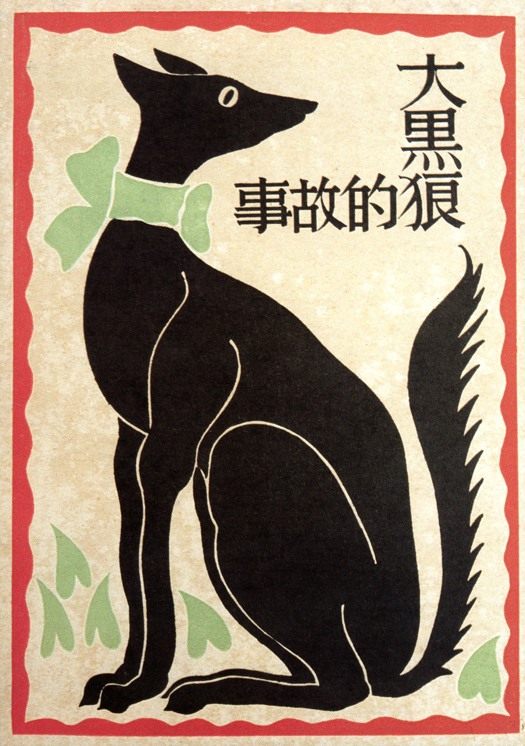 The Big Black Wolf, 1930
Designer: Qian Jun-tao
The Big Black Wolf, 1930
Designer: Qian Jun-tao
 A Great Love, 1930
Designer: Qian Jun-tao
A Great Love, 1930
Designer: Qian Jun-tao
 Modern Student, June 1931
Designer: Chen Zhi-fo
Modern Student, June 1931
Designer: Chen Zhi-fo
 Book cover, 1936
Designer: Zheng Ren-ze
Book cover, 1936
Designer: Zheng Ren-ze
 Children's Music, c. 1930
Designer: Qian Jun-tao
Children's Music, c. 1930
Designer: Qian Jun-tao
 Art Deco-style ad, c. 1930s
Art Deco-style ad, c. 1930s
 Creation Monthly, 1928
Creation Monthly, 1928
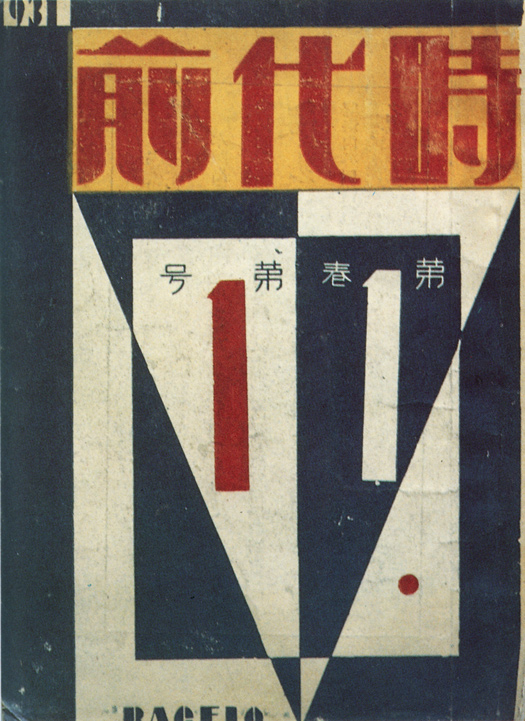 Ahead of the Times, January 1931
Designer: Qian Jun-tao
Ahead of the Times, January 1931
Designer: Qian Jun-tao
 Science and Engineering Magazine, 1935
Designer: Hong Qing
Science and Engineering Magazine, 1935
Designer: Hong Qing
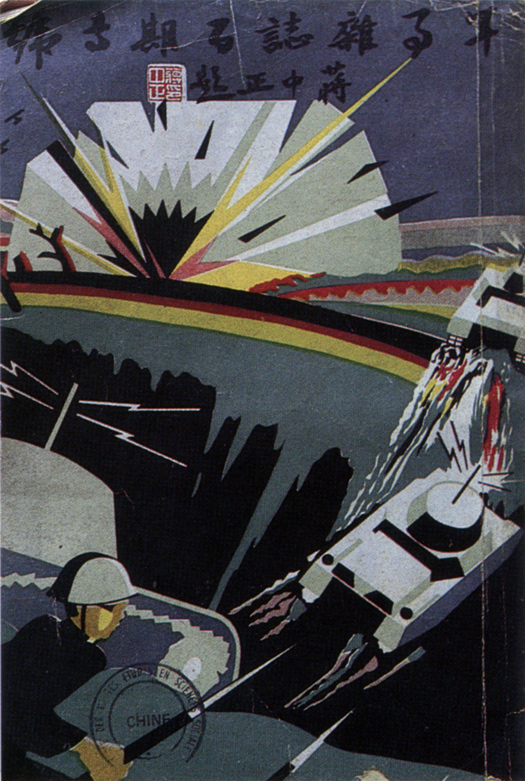 Military Magazine, April 1937
Military Magazine, April 1937
 China Sketch, April 1936
"Madame Sanger in China" (Sanger was an American proponent of birth control)
Illustrator: Zhu Jin-lou
China Sketch, April 1936
"Madame Sanger in China" (Sanger was an American proponent of birth control)
Illustrator: Zhu Jin-lou
 The Dividing Line in Love, 1929.
Designer: Qian Jun-tao
The Dividing Line in Love, 1929.
Designer: Qian Jun-tao
 The Ladies' Journal, October 1931
Designer: Zhang Ling-tao
The Ladies' Journal, October 1931
Designer: Zhang Ling-tao
 Wandering, August 1929
Designer: Tao Yuan-qing
Wandering, August 1929
Designer: Tao Yuan-qing
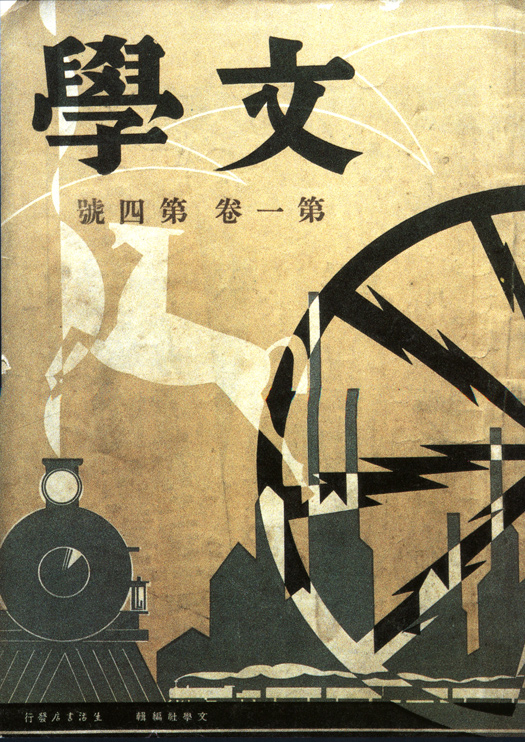 Literature, October 1933
Designer: Chen Zhi-fo
Literature, October 1933
Designer: Chen Zhi-fo
 Literature Weekly, undated issue on Russian short stories
Designer: Qian Jun-tao
Literature Weekly, undated issue on Russian short stories
Designer: Qian Jun-tao
 The Ark, February 1935
The Ark, February 1935
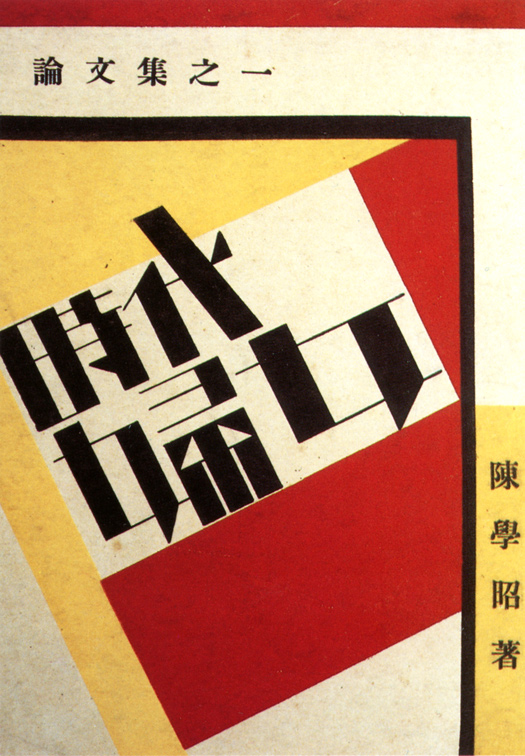 Modern Woman, 1933
Designer: Qian Jun-tao
Modern Woman, 1933
Designer: Qian Jun-tao
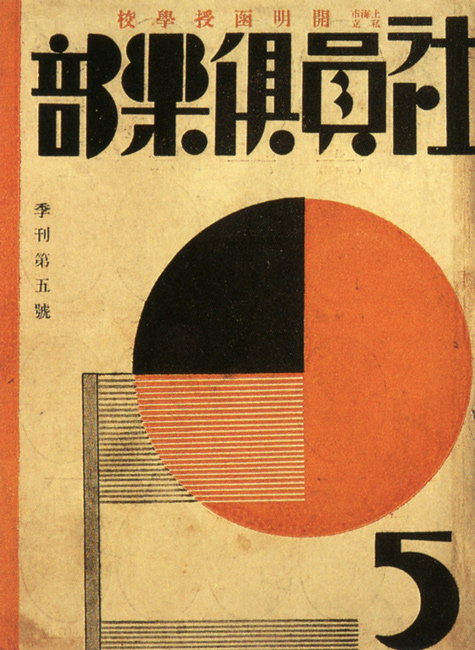 Shanghai Private Kaiming Correspondence School,
Members' Club Quarterly, c. 1930
Designer: Qian Jun-tao
Shanghai Private Kaiming Correspondence School,
Members' Club Quarterly, c. 1930
Designer: Qian Jun-tao
 The Muddy Stream, 1931
Designer: Qian Jun-tao
The Muddy Stream, 1931
Designer: Qian Jun-tao
 New literature advertisement, c. 1937
Designer: Zhang Xue-fu
For a few more political works see the complementary post on A Journey Round My Skull: Santa Claus delivers a new child into a world of violence and death
Publisher's description:From posters and advertisements to book covers and magazines, this book presents a dazzling panoply of modern graphic design in China.
Beginning with the basic traditions of Chinese graphics, the authors show how the writer and artist Lu Xun became the center of cultural revival in the new China. We see Art Deco coming to China in the Shanghai Style, and the birth of a dynamic national design style, born of Russian Constructivism and China’s own drive for new technology. The Socialist Realist art of Mao in turn adopted folk art traditions to fuel the Revolutionary machine, while the continuing search for a new identity can be seen in the graphic images of protest from the summer of 1989. 150 color and 135 black-and-white photographs and illustrations.
Chinese Graphic Design in the Twentieth Century makes a nice companion to the Steven Heller's Art Deco Graphic Design series for Chronicle (though it's published by Thames & Hudson).
Previously: Extraordinary early twentieth century book and magazine covers from Japan
Tweet this
New literature advertisement, c. 1937
Designer: Zhang Xue-fu
For a few more political works see the complementary post on A Journey Round My Skull: Santa Claus delivers a new child into a world of violence and death
Publisher's description:From posters and advertisements to book covers and magazines, this book presents a dazzling panoply of modern graphic design in China.
Beginning with the basic traditions of Chinese graphics, the authors show how the writer and artist Lu Xun became the center of cultural revival in the new China. We see Art Deco coming to China in the Shanghai Style, and the birth of a dynamic national design style, born of Russian Constructivism and China’s own drive for new technology. The Socialist Realist art of Mao in turn adopted folk art traditions to fuel the Revolutionary machine, while the continuing search for a new identity can be seen in the graphic images of protest from the summer of 1989. 150 color and 135 black-and-white photographs and illustrations.
Chinese Graphic Design in the Twentieth Century makes a nice companion to the Steven Heller's Art Deco Graphic Design series for Chronicle (though it's published by Thames & Hudson).
Previously: Extraordinary early twentieth century book and magazine covers from Japan
Tweet this